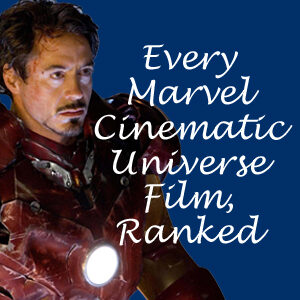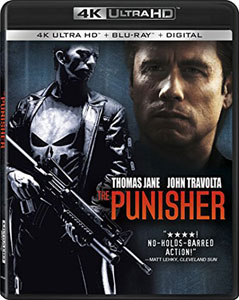“The Punisher” (2004) is a prime example of a movie that’s less than the sum of its parts. Obviously, it fails in a one-to-one comparison with Netflix’s “Punisher,” and it’d be easy to tear it down that way, but even on its own merits, it feels lightweight for a revenge movie.
Thomas Jane is a good actor, but his performance as Frank Castle leans toward stoic action-hero mode rather than tortured brooder, and Frank seems to enjoy doling out punishment – which might be a fascinating trait in a government agent except that the film doesn’t stop to reflect on it.
Neighbors spice things up
As a one-note story of a guy whose wife, son, father and mother are murdered and who then kills all those responsible, “The Punisher” is satisfying in paint-by-numbers fashion. The scenes of violence are well-staged and have a clever variety to them as Howard Saint (John Travolta) sends assassins after Frank.

“The Punisher” (2004)
Director: Jonathan Hensleigh
Writers: Jonathan Hensleigh, Michael France
Stars: Thomas Jane, John Travolta, Samantha Mathis
The Russian (Kevin Nash) shows up at Frank’s dingy apartment to kill him with pure muscle, leading to a vicious fight where we learn that the Punisher can take punishment. And Harry Heck (Mark Collie) engages Castle in a muscle-car battle that ends with Frank finding a use for his projectile blade.
Heck’s biggest contribution to the film turns out to be his red-dirt country song about Frank’s death, which he weirdly performs in a diner as a precursor to their clash. It’s a brief but welcome respite from the driving dirge rock (Drowning Pool, Puddle of Mudd, Nickelback, etc.) that otherwise fills the soundtrack, as such music did for most of the decade’s superhero movies.
The heart of “The Punisher” comes from Frank’s three neighbors in his evocatively ratty apartment complex, a step up from his sewer abode in the 1989 Dolph Lundgren version. They’ve formed a makeshift family and are welcoming of Frank, especially after he dispatches the abusive boyfriend of Joan (“X-Men’s” Rebecca Romijn-Stamos, on the short list of actors to do double duty in Marvel films). The other neighbors are techie Dave (Ben Foster) and foodie Bumpo (John Pinette). Seeing such warmth in a scary location is a welcome surprise.
Frank shows cleverness
Another surprise is that Frank’s killing skills don’t merely involve weapons. He’s clever as heck, starting with how he “tortures” Saint’s associate Micky (Eddie Jemison, before he himself played a mob boss on “iZombie”) by rubbing a popsicle on his back while roasting a steak with a blowtorch. Micky assumes he’s being burned so horribly that he feels coldness.
There’s a dark humor to this sequence, but later, Saint’s henchman Quentin (Will Patton) tortures Dave in a straightforward and horrifying fashion. The uneven tone leaves a viewer uncomfortably unbalanced, even if it also shows the difference between the good guy and the bad guys.

A decent amount of screen time in director/co-writer Jonathan Hensleigh’s two-hour film is spent showing Frank’s meticulous frame-job of Howard’s wife, Livia (Laura Harring), and best friend, Quentin, for an affair. One of Frank’s tricks is to use a fake fire hydrant to keep the parking spot open while he takes Livia’s car out for a spin to pile up fake evidence. Frank’s idea is that Howard will then kill his wife and bestie. Then Frank will inform Howard of what he has done, a creative way to twist the knife rather than simply dispatching his enemies.
This is where “The Punisher” gets particularly convenient, as Howard does exactly as Frank has planned. Although the killing scenes are admittedly entertaining, they demonstrate how tidy this movie is in every way except for Frank’s dingy living quarters and the wreckage (to both scenery and people’s bodies) in the wake of fight scenes. Saint kills the Castles and their friends, so Castle kills the Saints and their associates – nothing more complex than that.
Line up for the one-liners
The film has a lot of great action-movie one-liners, all set up to be action-movie one-liners. For instance, when Frank tells Joan to follow his exploits in the newspaper, she asks what section. “The obituaries” is his obvious, if quotable, reply. If Joan had merely said “OK,” I wonder if Frank would have followed by saying “Specifically, check the obituary section” for the sake of a zinger of an exit line. It’s hard to think of someone who sets up their own one-liners as having a lot of inner turmoil.
On a moment-by-moment basis, there’s not a lot to complain about with “The Punisher.” But in the big picture, Jane’s Frank Castle takes the slaughter of his family and his subsequent transformation into a killing machine in the stride of a 1980s action hero. (To be fair, Jane fits this mold better than Lundgren, because at least there’s some life to his performance.)
I guess in the end — since this version is fairly slick and modern — it’s impossible to avoid comparing this film to the Netflix series, where we never forget the pain Jon Bernthal’s Frank is feeling, and the fact that he doesn’t enjoy killing despite being driven to do it. But even back in 2004, it must’ve been clear that this “Punisher” is interested in being a fun action blockbuster rather than a meditation on the cost of violence.

